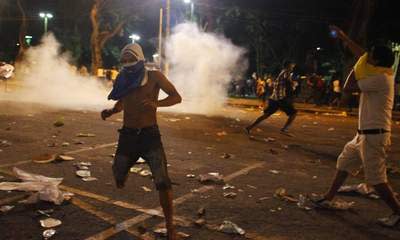Brazil Protests: Cabinet Meets After March

Brazilian government ministers were called to an emergency meeting after a million people took to the streets to protest against alleged corruption and high prices.
City centres around the country were still smouldering the morning after police responded to pockets of violence on Thursday night with tear gas and rubber bullets.
The demonstrations, which have spread to more than 80 cities look set to continue into a second week, prompting President Dilma Rousseff to assemble her top cabinet members on Friday and forcing her to cancel an overseas trip.
In Sao Paulo state, a protester was killed when a driver - apparently enraged about being unable to drive along a street - rammed his car into a crowd of demonstrators.
In Rio de Janeiro, 300,000 people staged a demonstration near City Hall, while in the capital Brasilia, hundreds of protesters tried to storm the foreign ministry building, leaving authorities "frightened", according to local newspaper O Estado de Sao Paulo.
Clashes have also taken place in the Amazon jungle city of Belem, in Porto Alegre in the south, in the university town of Campinas north of Sao Paulo and in the northeastern city of Salvador.
Sky Correspondent Jason Farrell, in Rio de Janeiro, said protests there began with a "carnival atmosphere", as demonstrators arrived "draped in flags or with stripes of Brazil's national green, yellow and blue painted onto their faces".
However, peaceful protesters were caught up in clashes between rioters and police, who fired tear gas and pepper spray into the crowds.
Law student Wallace Tarenta told Sky News: "I have come here because we need more money for hospitals and teachers and security - not more stadiums for the World Cup."
Protester Jorge Vieira added: "Brazil is a strong country, we have good natural resources and a strong government - but nothing goes to the people."
The protests in Brazil were sparked by public anger about the rising cost of public transport.
Several city leaders have already revoked planned increases to bus and subway fares.
However, Sky's Jason Farrell said anger has now turned to a perceived lack of investment in public services, as well as the \$15 billion cost of hosting next year's football World Cup.
"On the face of it, Brazil has it all: a growing economy, a World Cup and the 2016 Olympics to look forward to," he said.
"But protesters say a corrupt government is damaging the lives of working people while squandering money on showcase stadiums.
"With riots breaking out in cities across the country, the world is now watching Brazil and wondering how it will cope with the pressures of hosting two of the world's biggest sporting events."

 Yahoo News
Yahoo News 